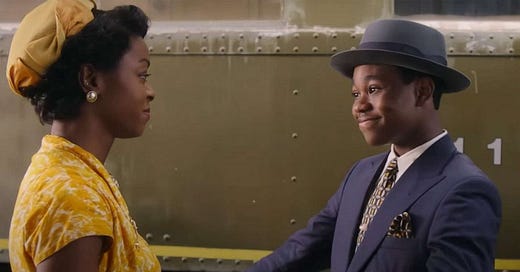Heartland: Till
Chinonye Chukwu's heartbreaking retelling of the foul murder of Emmett Till and his mother's courageous fight to not let it pass is among the year's best dramas.
For Heartland Film Festival showtimes and tickets, click here.
Mamie Till would not let it pass.
When her son Emmett’s body was returned to her in Chicago from Mississippi in 1955 and she saw what racist whites had done to the 14-year-old boy known as “Bobo” to those closest to him, she could have shrunk away. She could have hidden and forgiven. She could have tried to put the pain behind her and move on with her own life.
But she didn’t. Mamie Till (then using the surname Bradley) witnessed that unspeakable desecration of an innocent child, her child, and refused to let it go.
We all know what happened next. Mamie demanded that Emmett’s body be shown in an open casket, the hideous wounds to his body on display for all to see. It was a galvanizing moment in American history that, as much as Rosa Parks’ refusal to go to the back of the bus a few months later, sparked the civil rights movement that changed the face of the nation.
I’ve been anticipating “Till” more than perhaps any other film this season, and it does not disappoint. Director Chinonye Chukwu (“Clemency”), who also co-wrote the script with John Reilly and Keith Beauchamp, has created a heartrending film that will sear the soul and fire the outrage inside our hearts.
When Emmett, a joyful boy raised in Chicago, was killed by a pair of racists in Money, Miss., over a supposed wolf whistle at a white store clerk, it was right before the dawn of the mass media age. Television was still new and, even for those who had it, did not broadcast that kind of imagery. News stories might take days or even weeks to circulate across the country. The spoken word still held more sway in some places than a newspaper or magazine.
“Till” is a piece of history, made flesh and immediate.
Emmett is played by Jalyn Hall, whose wide, beautiful face perpetually adorned with a gap-tooth smile makes our hearts ache, knowing what is to come. He compels us to see and hear him as a person, not just a bloated, chewed-up body in grainy black-and-white photographs.
Really, though, this story is not his but Mamie’s. Played by Danielle Deadwyler, who made such a strong impression as Cuffie in last year’s “The Harder They Fall,” she is a woman who starts out as a small and fearful person, seemingly haunted by the foreknowledge that Bobo’s trip to Mississippi to visit cousins will end in tragedy. By the end of the story, she’s a towering figure of strength and moral authority.
Chukwu photographs Deadwyler in a very intimate way, using lots of extreme close-ups so we stare transfixed straight through her eyes and into her soul. We watch her gaze gradually change from meekness to shock to anger, almost like the inexorable coming of the tide.
If Deadwyler’s name isn’t spoken loudly when film awards nominations start coming out, then something’s very askew.
Like any good retelling of well-known history, I learned things I didn’t know before. Like that his uncle Mose “Preacher” Wright, had a shotgun at the ready the night the two white men came to his house in the middle of the night, demanding that Bobo be brought forth. He knew what would happen to Bobo — two other men had recently been lynched for registering Blacks to vote — but Preacher stayed his hand.
Played by John Douglas Thompson, he has an amazing scene where Mamie demands to know why Preacher didn’t use his gun to protect her son. The answer may not satisfy anyone, but we see how his choice was the only one he could have made in that place and time.
Wright later made another decision, in some ways even braver, to do something that had never been done before in a Mississippi court of law.
The trial of the two men — I will not type their names — while representing the dramatic crescendo of the story, is also in some ways an afterthought. Its outcome was never really in any doubt, either by Mamie or any of the civil rights leaders who assisted and supported her. But simply going down there and offering her testimony as a mother horribly wronged represented its own victory — or at least the beginning of another long one.
Whoopi Goldberg and Frankie Faison play Mamie’s parents, representatives of the old school of thinking who nonetheless stood by her side. Sean Patrick Thomas has a surprisingly hefty turn as Mamie’s boyfriend (later husband), who supported her even if it meant taking a step back.
Tosin Cole has a small but memorable part as civil rights activist Medgar Evers — another victim in the long war — and Kevin Carroll plays Rayfield Mooty, an NAACP lawyer who appears to be an amalgamation of several real figures.
“Till” has a beginning and ending that by definition are already known to us. Yet this amazing, stirring film manages to surprise us in myriad ways, big and small.





